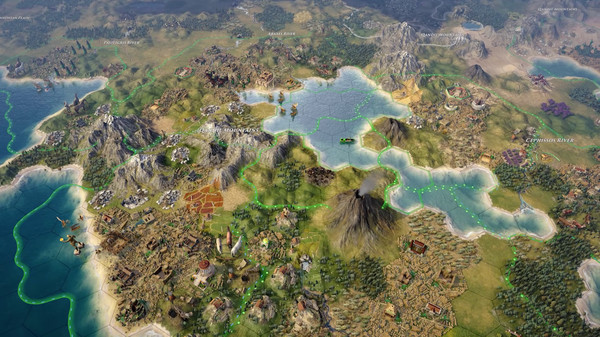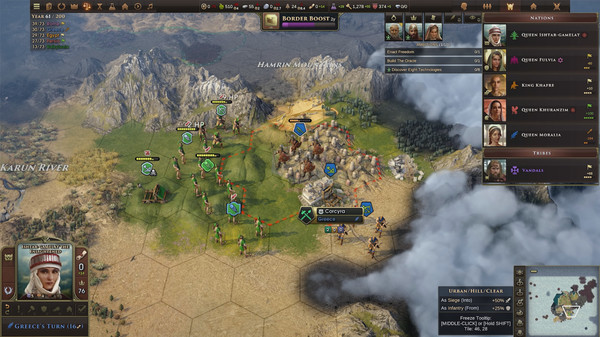A Mix of Genres Old World was developed by the lead designer of Civ IV (Soren Johnson), along with a whole team of designers, coders, and artists. The gameplay is a compelling mix of Civ (4X) and a light layer of Crusader Kings (grand strategy). Like Civ, you start cities with settlers, explore with scouts, exploit territorial resources with workers (making buildings and unique Wonders), and form armies and navies with military units (promoting them and assigning them generals if you wish). But like CK3, everyone has an opinion of you (individual characters, families, tribes, and nations), and you can influence all of these directly as the leader of your nation, or indirectly through people you appoint to council positions (ambassador, chancellor, spymaster). Council members can perform various tasks for you (treaties, trade, spying/disruption, assassination). You can get your heir educated or married (ready to take over when you die), and any character in the game can acquire strengths and weaknesses among several attributes. Your brother can turn out to be 'bold,' 'ruthless,' and 'insane' (my last game), making him excellent military general material. Your mother can be 'cunning,' 'debauched,' and 'drunk,' ensuring discontent in the city she governs but unlocking caravan access for you. (There are 77 of these traits, and they can appear in larger clusters.) There is an event pop-up system with richly detailed, painted scenes, depicting yet another crazy thing your nation will have to overcome, or heralding an unexpected boon. Soundtrack The soundtrack, well over 70 tracks long, is so good it was nominated for a Grammy award back in 2022. (The composer Christopher Tin already won a Grammy for Civ IV's "Baba Yetu" back in 2011.) I've never heard a soundtrack this good in a strategy game, and you can control it through an in-game player if you'd like. I played the soundtrack while writing this review, and it was glorious. The Orders System The game has a unique, nationwide 'orders' system that combines with the individual unit 'fatigue' system in a way that forces you to plan out how you will spend the current game year. If you want to use all your orders to simply move units across the map, then you may not be able to do everything you want construction-wise in your cities, or do all the diplomacy you want with other nations. It's nice having to think this out ahead of time, and it gives you real ownership over how things play out each turn, rather than a boring 'move everything once until everything possible is moved, repeat next turn.' Massive Customization Few reviews give a sense of the massive and completely well thought out set of options you get when you want to start something other than a default game. So I decided to focus on that for the rest of this review. Every one of the following options is described through a convenient tooltip, so you know exactly what you're getting. (Just page through to the end if your eyes glaze over.) Simple Setup Difficulty Levels: The New, The Able, The Just, The Good, The Strong, The Noble, The Glorious, The Magnificent, The Great. (Each fine-tunes a bunch of things within five categories - Prosperity, AI Aggression, AI Handicap, Tribe Level, and Calamities - and tells you exactly what they are so you don't have to guess.) Use Random Map or Premade Map (that you load) Map Script: Archipelago, Arid Plateau, Bay, Coastal Rain Basin, Continent, Desert, Disjunction, Donut, Ebbing Sea, Hardwood Forest, Highlands, Inland Sea, Lakes and Gulfs, Mediterranean, Multiple Continents, Northern Ocean, Player Islands, Rejuvenation, Seaside, Tumbling Mountain, Random Map Size: Duel, Small, Medium, Large, Huge Event Level: No Events, Minimal, Low, Moderate, High Advanced Setup (in addition to the above) Nation: Aksum, Assyria, Babylonia, Carthage, Egypt, Greece, Hatti, Kush, Persia, Rome, Random, Pick Later (after first city) Leader Archetype: Preset Leader, Hero, Commander, Tactician, Zealot, Schemer, Orator, Diplomat, Judge, Builder, Scholar, Random, Pick Later (after game start) Dynasty: there are 52 leaders to pick from across the 10 nations listed earlier. For example, here are Rome's leaders: Romulus, Scipio, Marius, Sulla, Julius Caesar, Augustus, Agrippina. Or you can pick 'Random' or 'Pick Later'. Prosperity: Abundant, Affluent, Thriving, Comfortable, Sufficient, Modest, Fragile AI Development: None, Fledgling, Established, Advanced, Massive AI Aggression: Passive, Peaceful, Normal, Aggressive, Competitive AI Handicap: High Penalty, Moderate Penalty, Small Penalty, None, Small Advantage, Moderate Advantage, High Advantage, Very High Advantage Tribal Strength: None, Passive, Weak, Normal, Strong, Raging Calamities: None, Very Rare, Rare, Default, Common, Very Common Mortality: Lengthy, Standard, Realistic Turn Scale: Years, Semesters, Seasons Succession Gender: Agnatic, Agnatic Cognatic, Absolute Cognatic, Enatic Cognatic, Enatic, Random Succession Order: Primogeniture, Ultimogeniture, Lateral, Dynastic, Seniority, Random Points to Win: Low, Normal, High, Very High Player Start Location: Coastal, Inland, Anywhere Tribal Lands: Five Tribes, Four Tribes, Random Extreme Terrain: None, Either, Tundra, Desert Resource Density: High, Medium, Low, Random City Site Density: High, Medium, Low, Random City Site Number: Unrestricted, Restricted, Family Seats, Capitals, Random Forced March: Unlimited, Double Fatigue, Disabled Reset Random Seed on Reload Select Mods: pick what you want Select DLC: turn any DLC on or off Turn On or Off: 21 options I don't have space to list Parameter String Here you can actually "replay an in-progress game from the start by copying its parameter string from the in-game menu." Now, that's just an insane amount of customization, so you can hand-craft whatever level and kind of challenge you want. A "No Characters" option means you can completely turn off the Crusader Kings stuff and just play a 4X game without worrying about family and opinion. Characters and Families are removed from the game, if you just want to see what that's like. And obviously, you can ignore all of this tweaking and jump right in with a default game. Or anything in between. Two Kinds of Tutorial for New Players There are "Learn to Play" (Scripted) and "Learn by Playing" (Freeform) tutorials. Five scripted tutorials cover various aspects of the game, leading you from your first settler to fielding a large army that takes on Rome, teaching you about movement, the economy, influencing characters and families, diplomacy, and warfare. Four unscripted scenarios (Babylonia, Egypt, Persia, and Rome) take you across gradually increasing difficulty levels. It's just like a regular game, in that anything can happen, but there are tutorial pop-ups along the way. You can save and resume any tutorial at any time. Miscellaneous Stuff There are 376 achievements to go for. Playing with mods doesn't affect achievements, and one of the devs all by himself has provided 20 mods for the game on the Steam Workshop. Old World's deft UI design has never left me confused or not knowing what an icon means. (It swipes CK3's tooltip system, letting you freeze nested tooltips in place with middle-mouse or shift if you want.) There is an in-game encyclopedia. There are separate editors for maps, events, and portraits, if you want to change stuff at a granular level. Conclusion Old World is a thrilling distraction from everyday life, utterly absorbing every time I play, and the soundtrack just sings. It's not just a sandbox; it's an entire beach, the whole coastline, just waiting for you to build your castles and see what you can do next. Old World is a significant achievement in blending 4X with grand strategy. Buy all the DLC in one of the frequent sales they have. How else are you going to get hurricanes, plagues, and volcanic eruptions, hand off the managing of your city to The Grand Vizier, or respond to growing religious dissent? :-)
Expand the review






























